formerly eScholarship Editions


|
|
|
|
Your search for
'American Studies' in subject
found 234 book(s). | Modify Search | Displaying 41 - 60 of 234 book(s) | |
| 41. | 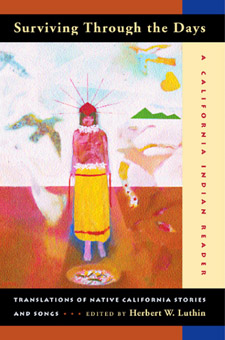 | Title: Surviving through the days: translations of Native California stories and songs: a California Indian reader Author: Luthin, Herbert W 1954- Published: University of California Press, 2002 Subjects: Anthropology | American Studies | Native American Studies | American Literature Publisher's Description: This anthology of treasures from the oral literature of Native California, assembled by an editor admirably sensitive to language, culture, and history, will delight scholars and general readers alike. Herbert Luthin's generous selection of stories, anecdotes, myths, reminiscences, and songs is drawn from a wide sampling of California's many Native cultures, and although a few pieces are familiar classics, most are published here for the first time, in fresh literary translations. The translators, whether professional linguists or Native scholars and storytellers, are all acknowledged experts in their respective languages, and their introductions to each selection provide welcome cultural and biographical context. Augmenting and enhancing the book are Luthin's engaging, informative essays on topics that range from California's Native languages and oral-literary traditions to critical issues in performance, translation, and the history of California literary ethnography. [brief] Similar Items |
| 42. | 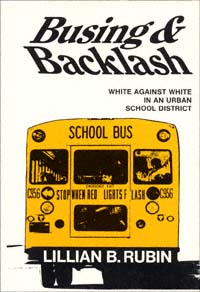 | Title: Busing and backlash: white against white in a California school district Lillian B. Rubin Author: Rubin, Lillian B Published: University of California Press, 1973 Subjects: Sociology | Urban Studies | American Studies | African American Studies Similar Items |
| 43. |  | Title: Carried to the wall: American memory and the Vietnam Veterans Memorial Author: Hass, Kristin Ann 1965- Published: University of California Press, 1998 Subjects: American Studies | United States History | Sociology Publisher's Description: On May 9, 1990, a bottle of Jack Daniels, a ring with letter, a Purple Heart and Bronze Star, a baseball, a photo album, an ace of spades, and a pie were some of the objects left at the Vietnam Veterans War Memorial. For Kristin Hass, this eclectic sampling represents an attempt by ordinary Americans to come to terms with a multitude of unnamed losses as well as to take part in the ongoing debate of how this war should be remembered. Hass explores the restless memory of the Vietnam War and an American public still grappling with its commemoration. In doing so it considers the ways Americans have struggled to renegotiate the meanings of national identity, patriotism, community, and the place of the soldier, in the aftermath of a war that ruptured the ways in which all of these things have been traditionally defined. Hass contextualizes her study of this phenomenon within the history of American funerary traditions (in particular non-Anglo traditions in which material offerings are common), the history of war memorials, and the changing symbolic meaning of war. Her evocative analysis of the site itself illustrates and enriches her larger theses regarding the creation of public memory and the problem of remembering war and the resulting causalities - in this case not only 58,000 soldiers, but also conceptions of masculinity, patriotism, and working-class pride and idealism. [brief] Similar Items |
| 44. | 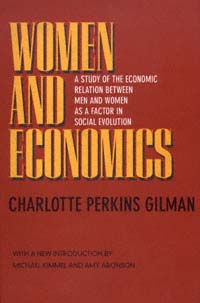 | Title: Women and economics: a study of the economic relation between men and women as a factor in social evolution Author: Gilman, Charlotte Perkins 1860-1935 Published: University of California Press, 1998 Subjects: Gender Studies | History | American Studies | Women's Studies Publisher's Description: When Charlotte Perkins Gilman's first nonfiction book, Women and Economics , was published exactly a century ago, in 1898, she was immediately hailed as the leading intellectual in the women's movement. Her ideas were widely circulated and discussed; she was in great demand on the lecture circuit, and her intellectual circle included some of the most prominent thinkers of the age. Yet by the mid-1960s she was nearly forgotten, and Women and Economics was long out of print. Revived here with new introduction, Gilman's pivotal work remains a benchmark feminist text that anticipates many of the issues and thinkers of 1960s and resonates deeply with today's continuing debate about gender difference and inequality.Gilman's ideas represent an integration of socialist thought and Darwinian theory and provide a welcome disruption of the nearly all-male canon of American economic and social thought. She stresses the connection between work and home and between public and private life; anticipates the 1960s debate about wages for housework; calls for extensive childcare facilities and parental leave policies; and argues for new housing arrangements with communal kitchens and hired cooks. She contends that women's entry into the public arena and the reforms of the family would be a win-win situation for both women and men as the public sphere would no longer be deprived of women's particular abilities, and men would be able to enlarge the possibilities to experience and express the emotional sustenance of family life.The thorough and stimulating introduction by Michael Kimmel and Amy Aronson provides substantial information about Gilman's life, personality, and background. It frames her impact on feminism since the Sixties and establishes her crucial role in the emergence of feminist and social thought. [brief] Similar Items |
| 45. | 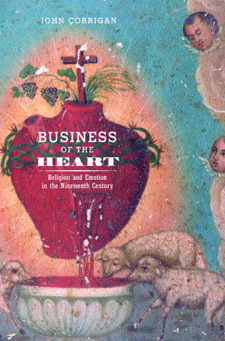 | Title: Business of the heart: religion and emotion in the nineteenth century Author: Corrigan, John 1952- Published: University of California Press, 2001 Subjects: Religion | American Studies | United States History | Christianity Publisher's Description: The "Businessmen's Revival" was a religious revival that unfolded in the wake of the 1857 market crash among white, middle-class Protestants. Delving into the religious history of Boston in the 1850s, John Corrigan gives an imaginative and wide-ranging interpretive study of the revival's significance. He uses it as a focal point for addressing a spectacular range of phenomena in American culture: the ecclesiastical and business history of Boston; gender roles and family life; the history of the theater and public spectacle; education; boyculture; and, especially, ideas about emotion during this period. This vividly written narrative recovers the emotional experiences of individuals from a wide array of little-used sources including diaries, correspondence, public records, and other materials. From these sources, Corrigan discovers that for these Protestants, the expression of emotion was a matter of transactions. They saw emotion as a commodity, and conceptualized relations between people, and between individuals and God, as transactions of emotion governed by contract. Religion became a business relation with God, with prayer as its legal tender. Entering this relationship, they were conducting the "business of the heart." This innovative study shows that the revival--with its commodification of emotional experience--became an occasion for white Protestants to underscore differences between themselves and others. The display of emotion was a primary indicator of membership in the Protestant majority, as much as language, skin color, or dress style. As Corrigan unravels the significance of these culturally constructed standards for emotional life, his book makes an important contribution to recent efforts to explore the links between religion and emotion, and is an important new chapter in the history of religion. [brief] Similar Items |
| 46. | 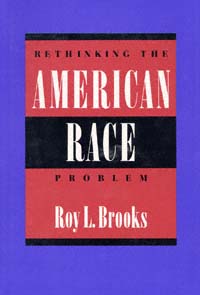 | Title: Rethinking the American race problem Author: Brooks, Roy L. (Roy Lavon) 1950- Published: University of California Press, 1990 Subjects: American Studies | Law | Politics | Ethnic Studies Publisher's Description: If the conservative view of the American race problem is frightening, the traditional liberal view seems impotent. Analyzing the race problem from neither right nor left, Brooks sheds a new and clarifying light on America's longest running social and moral dilemma.This incisive book provides a bold new examination of the seemingly intractable racial problems confronting Americans at the end of the twentieth century. In a wide-ranging and probing study, Brooks calls into question the prevailing wisdom about racism, civil rights legislation, and the composition of the Black community, going on to offer a dramatic new approach to the race problem. In Brooks' mind, civil rights laws - laws targeted at racial discrimination - have not only failed to engender racial equality, but have in fact had a negative effect on the standard of living of many Blacks. Brooks defines the American race problem so as to carefully separate racial oppression from (economic) class oppression and explains how civil rights legislation since the 1960s has hurt Black Americans of every class. He offers a strategy for resolving the country's racial inequities, unique in its attentiveness to class division in Black society, that combines governmental remedies and an unprecedented program of Black self-help.While Brooks argues that the government has the means to resolve the race dilemma, he suggests that it lacks the spirit to do so. Thus, it may be time for Black Americans to come to grips with an unpleasant reality - namely, that they can count on the government only for minimal alleviation, and must take on the larger portion of responsibility for resolving the American race problem themselves.Certain to arouse controversy, Rethinking the American Race Problem offers new understandings of issues often clouded by misconceptions and backward notions. It is an important book for anyone concerned about the current state of race relations in America. [brief] Similar Items |
| 47. | 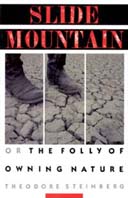 | Title: Slide Mountain, or, The folly of owning nature Author: Steinberg, Theodore 1961- Published: University of California Press, 1995 Subjects: Law | Environmental Studies | United States History | American Studies Publisher's Description: The drive to own the natural world in twentieth-century America seems virtually limitless. Signs of this national penchant for possessing nature are everywhere - from suburban picket fences to elaborate schemes to own underground water, clouds, even the ocean floor.Yet, as Theodore Steinberg demonstrates in this compelling, witty look at Americans' attempts to master the environment, nature continually turns these efforts into folly. In a rich, narrative style recalling the work of John McPhee, Steinberg tours America to explore some of the more unusual dilemmas that have arisen in our struggle to possess nature.Beginning along the Missouri River, Steinberg recounts the battle for three thousand acres of land the river carved from a Nebraska Indian reservation and deposited in Iowa. Then he travels to Louisiana, where an army of lawyers butted heads over whether Six Mile Lake was actually a lake or a stream. He continues to Arizona to investigate who owned the underground, then to Pennsylvania's Blue Ridge Mountains to see who claimed the clouds. He ends in crowded New York City with Donald Trump's struggle for air rights.Americans' obsession with owning nature was immortalized by Mark Twain in the tale of Slide Mountain, where a landslide-prone Nevada peak turned the American dream of real estate into dust. In relating these modern-day "Slide Mountain" stories, Steinberg illuminates what it means to live in a culture of property where everything must have an owner. [brief] Similar Items |
| 48. | 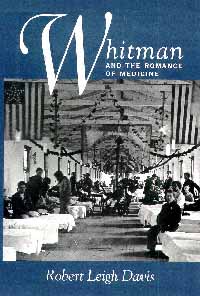 | Title: Whitman and the romance of medicine Author: Davis, Robert Leigh 1956- Published: University of California Press, 1997 Subjects: American Studies | American Literature | Gender Studies Publisher's Description: In this compelling, accessible examination of one of America's greatest cultural and literary figures, Robert Leigh Davis details the literary and social significance of Walt Whitman's career as a nurse during the American Civil War. Davis shows how the concept of "convalescence" in nineteenth-century medicine and philosophy - along with Whitman's personal war experiences - provide a crucial point of convergence for Whitman's work as a gay and democratic writer.In his analysis of Whitman's writings during this period - Drum-Taps, Democratic Vistas, Memoranda During the War , along with journalistic works and correspondence - Davis argues against the standard interpretation that Whitman's earliest work was his best. He finds instead that Whitman's hospital writings are his most persuasive account of the democratic experience. Deeply moved by the courage and dignity of common soldiers, Whitman came to identify the Civil War hospitals with the very essence of American democratic life, and his writing during this period includes some of his most urgent reflections on suffering, sympathy, violence, and love. Davis concludes this study with an essay on the contemporary medical writer Richard Selzer, who develops the implications of Whitman's ideas into a new theory of medical narrative. [brief] Similar Items |
| 49. | 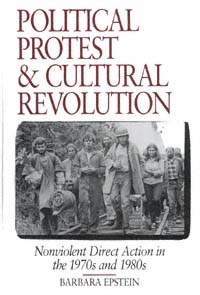 | Title: Political protest and cultural revolution: nonviolent direct action in the 1970s and 1980s Author: Epstein, Barbara Published: University of California Press, 1991 Subjects: History | Politics | American Studies | United States History | Sociology Publisher's Description: From her perspective as both participant and observer, Barbara Epstein examines the nonviolent direct action movement which, inspired by the civil rights movement, flourished in the United States from the mid-seventies to the mid-eighties. Disenchanted with the politics of both the mainstream and the organized left, and deeply committed to forging communities based on shared values, activists in this movement developed a fresh, philosophy and style of politics that shaped the thinking of a new generation of activists. Driven by a vision of an ecologically balanced, nonviolent, egalitarian society, they engaged in political action through affinity groups, made decisions by consensus, and practiced mass civil disobedience.The nonviolent direct action movement galvanized originally in opposition to nuclear power, with the Clamshell Alliance in New England and then the Abalone Alliance in California leading the way. Its influence soon spread to other activist movements - for peace, non-intervention, ecological preservation, feminism, and gay and lesbian rights.Epstein joined the San Francisco Bay Area's Livermore Action Group to protest the arms race and found herself in jail along with a thousand other activists for blocking the road in front of the Lawrence Livermore Laboratory. She argues that to gain a real understanding of the direct action movement it is necessary to view it from the inside. For with its aim to base society as a whole on principles of egalitarianism and nonviolence, the movement sought to turn political protest into cultural revolution. [brief] Similar Items |
| 50. | 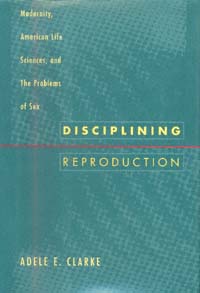 | Title: Disciplining reproduction: modernity, American life sciences, and "the problems of sex" Author: Clarke, Adele Published: University of California Press, 1998 Subjects: Sociology | Medical Anthropology | Medicine | American Studies | Gender Studies Publisher's Description: Reproductive issues from sex and contraception to abortion and cloning have been controversial for centuries, and scientists who attempted to turn the study of reproduction into a discipline faced an uphill struggle. Adele Clarke's engrossing story of the search for reproductive knowledge across the twentieth century is colorful and fraught with conflict.Modern scientific study of reproduction, human and animal, began in the United States in an overlapping triad of fields: biology, medicine, and agriculture. Clarke traces the complicated paths through which physiological approaches to reproduction led to endocrinological approaches, creating along the way new technoscientific products from contraceptives to hormone therapies to new modes of assisted conception - for both humans and animals. She focuses on the changing relations and often uneasy collaborations among scientists and the key social worlds most interested in their work - major philanthropists and a wide array of feminist and medical birth control and eugenics advocates - and recounts vividly how the reproductive sciences slowly acquired standing.By the 1960s, reproduction was disciplined, and the young and contested scientific enterprise proved remarkably successful at attracting private funding and support. But the controversies continue as women - the targeted consumers - create their own reproductive agendas around the world. Elucidating the deep cultural tensions that have permeated reproductive topics historically and in the present, Disciplining Reproduction gets to the heart of the twentieth century's drive to rationalize reproduction, human and nonhuman, in order to control life itself. [brief] Similar Items |
| 51. | 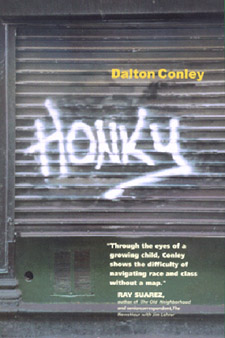 | Title: Honky Author: Conley, Dalton 1969- Published: University of California Press, 2000 Subjects: Sociology | Urban Studies | American Studies | Autobiography Publisher's Description: This intensely personal and engaging memoir is the coming-of-age story of a white boy growing up in a neighborhood of predominantly African American and Latino housing projects on New York's Lower East Side. Vividly evoking the details of city life from a child's point of view - the streets, buses, and playgrounds - Honky poignantly illuminates the usual vulnerabilities of childhood complicated by unusual circumstances. As he narrates these sharply etched and often funny memories, Conley shows how race and class shaped his life and the lives of his schoolmates and neighbors. A brilliant case study for illuminating the larger issues of inequality in American society, Honky brings us to a deeper understanding of the privilege of whiteness, the social construction of race, the power of education, and the challenges of inner-city life. Conley's father, a struggling artist, and his mother, an aspiring writer, joined Manhattan's bohemian subculture in the late 1960s, living on food stamps and raising their family in a housing project. We come to know his mother: her quirky tastes, her robust style, and the bargains she strikes with Dalton - not to ride on the backs of buses, and to always carry money in his shoe as protection against muggers. We also get to know his father, his face buried in racing forms, and his sister, who in grade school has a burning desire for cornrows. From the hilarious story of three-year-old Dalton kidnapping a black infant so he could have a baby sister to the deeply disturbing shooting of a close childhood friend, this memoir touches us with movingly rendered portraits of people and the unfolding of their lives. Conley's story provides a sophisticated example of the crucial role culture plays in defining race and class. Both of Conley's parents retained the "cultural capital" of the white middle class, and they passed this on to their son in the form of tastes, educational expectations, and a general sense of privilege. It is these advantages that ultimately provide Conley with his ticket to higher education and beyond. A tremendously good read, Honky addresses issues both timely and timeless that pertain to us all. [brief] Similar Items |
| 52. | 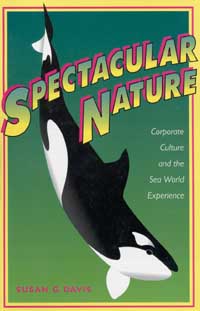 | Title: Spectacular nature: corporate culture and the Sea World experience Author: Davis, Susan G 1953- Published: University of California Press, 1997 Subjects: Environmental Studies | Popular Culture | American Studies | Sociology Publisher's Description: This is the story of Sea World, a theme park where the wonders of nature are performed, marketed, and sold. With its trademark star, Shamu the killer whale - as well as performing dolphins, pettable sting rays, and reproductions of pristine natural worlds - the park represents a careful coordination of shows, dioramas, rides, and concessions built around the theme of ocean life. Susan Davis analyzes the Sea World experience and the forces that produce it: the theme park industry; Southern California tourism; the privatization of urban space; and the increasing integration of advertising, entertainment, and education. The result is an engaging exploration of the role played by images of nature and animals in contemporary commercial culture, and a precise account of how Sea World and its parent corporation, Anheuser-Busch, succeed. Davis argues that Sea World builds its vision of nature around customers' worries and concerns about the environment, family relations, and education.While Davis shows the many ways that Sea World monitors its audience and manipulates animals and landscapes to manufacture pleasure, she also explains the contradictions facing the enterprise in its campaign for a positive public identity. Shifting popular attitudes, animal rights activists, and environmental laws all pose practical and public relations challenges to the theme park. Davis confronts the park's vast operations with impressive insight and originality, revealing Sea World as both an industrial product and a phenomenon typical of contemporary American culture. Spectacular Nature opens an intriguing field of inquiry: the role of commercial entertainment in shaping public understandings of the environment and environmental problems. [brief] Similar Items |
| 53. | 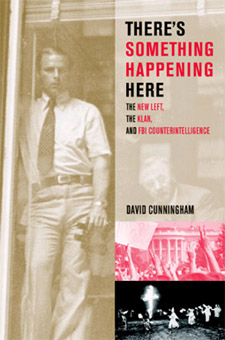 | Title: There's something happening here: the New Left, the Klan, and FBI counterintelligence Author: Cunningham, David 1970- Published: University of California Press, 2004 Subjects: American Studies | History | Politics | Sociology | Law Publisher's Description: Using over twelve thousand previously classified documents made available through the Freedom of Information Act, David Cunningham uncovers the riveting inside story of the FBI's attempts to neutralize political targets on both the Right and the Left during the 1960s. Examining the FBI's infamous counterintelligence programs (COINTELPROs) against suspected communists, civil rights and black power advocates, Klan adherents, and antiwar activists, he questions whether such actions were aberrations or are evidence of the bureau's ongoing mission to restrict citizens' right to engage in legal forms of political dissent. At a time of heightened concerns about domestic security, with the FBI's license to spy on U.S. citizens expanded to a historic degree, the question becomes an urgent one. This book supplies readers with insights and information vital to a meaningful assessment of the current situation. There's Something Happening Here looks inside the FBI's COINTELPROs against white hate groups and the New Left to explore how agents dealt with the hundreds of individuals and organizations labeled as subversive threats. Rather than reducing these activities to a product of the idiosyncratic concerns of longtime director J. Edgar Hoover, Cunningham focuses on the complex organizational dynamics that generated literally thousands of COINTELPRO actions. His account shows how--and why--the inner workings of the programs led to outcomes that often seemed to lack any overriding logic; it also examines the impact the bureau's massive campaign of repression had on its targets. The lessons of this era have considerable relevance today, and Cunningham extends his analysis to the FBI's often controversial recent actions to map the influence of the COINTELPRO legacy on contemporary debates over national security and civil liberties. [brief] Similar Items |
| 54. | 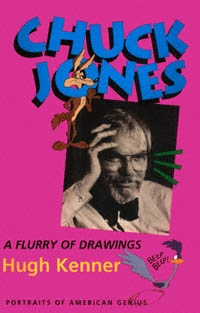 | Title: Chuck Jones: a flurry of drawings Author: Kenner, Hugh Published: University of California Press, 1994 Subjects: American Studies | Film | Autobiographies and Biographies Publisher's Description: Creator of the mono-maniacal Wile E. Coyote and his elusive prey, the Road Runner, Chuck Jones has won three Academy Awards and been responsible for many classics of animation featuring Bugs Bunny, Daffy Duck, Porky Pig, and Elmer Fudd. Who better to do Chuck Jones than Hugh Kenner, master wordsmith and technophile, a man especially qualified to illuminate the form of literacy that Jones so wonderfully executes in the art of character animation? A Flurry of Drawings reveals in cartoon-like sequences the irrepressible humor and profound reflection that have shaped Chuck Jones's work. Unlike Walt Disney, Jones and his fellow animators at Warner Brothers were not interested in cartoons that mimicked reality. They pursued instead the reality of the imagination, the Toon world where believability is more important than realism and movement is the ultimate aesthetic arbiter. Kenner offers both a fascinating explanation of cartoon culture and a new understanding of art's relationship to technology, criticism, freedom, and imagination. [brief] Similar Items |
| 55. |  | Title: The Antislavery debate: capitalism and abolitionism as a problem in historical interpretation Author: Bender, Thomas Published: University of California Press, 1992 Subjects: History | United States History | American Studies Publisher's Description: This volume brings together one of the most provocative debates among historians in recent years. The center of controversy is the emergence of the antislavery movement in the United States and Britain and the relation of capitalism to this development.The essays delve beyond these issues, however, to raise a deeper question of historical interpretation: What are the relations between consciousness, moral action, and social change? The debate illustrates that concepts common in historical practice are not so stable as we have thought them to be. It is about concepts as much as evidence, about the need for clarity in using the tools of contemporary historical practice.The participating historians are scholars of great distinction. Beginning with an essay published in the American Historical Review ( AHR ), Thomas L. Haskell challenged the interpretive framework of David Brion Davis's celebrated study, The Problem of Slavery in the Age of Revolution . The AHR subsequently published responses by Davis and by John Ashworth, as well as a rejoinder by Haskell. The AHR essays and the relevant portions of Davis's book are reprinted here. In addition, there are two new essays by Davis and Ashworth and a general consideration of the subject by Thomas Bender.This is a highly disciplined, insightful presentation of a major controversy in historical interpretation that will expand the debate into new realms. [brief] Similar Items |
| 56. | 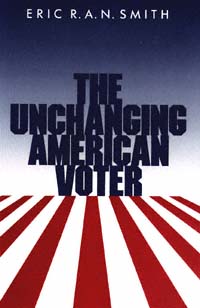 | Title: The unchanging American voter Author: Smith, Eric R. A. N Published: University of California Press, 1989 Subjects: Politics | United States History | American Studies Publisher's Description: Have the American people grown more politically sophisticated in the past three decades, or do they remain relatively ignorant of the political world? Did a "great leap forward" take place during the 1960s in which our citizenry became involved and adept voters? In this important book, Eric Smith addresses these and other provocative questions that have long befuddled political scientists and policymakers.Much of the current wisdom about American voters derives from an argument advanced in a volume entitled The Changing American Voter , written by Nie, Verba, and Petrocik. In this work, the authors contend that the electorate made a "great leap forward" in political sophistication and ideological thinking between the 1960 and 1964 elections. They argue that people changed in response to a shifting environment, and that, in particular, the surge of protest and ideological rhetoric between 1960 and 1964 engendered a new political savvy and sophistication. In their view, people learned to understand politics better, to relate the issues to the candidates more accurately, and to cast more informed, intelligent votes.In The Unchanging American Voter , Smith takes issue with this portrait of an engaged American citizenry and replaces it with a quite different picture of the voters of this nation. He posits a more bleak political l andscape in which the typical voter knows little about politics, is not interested in the political arena and consequently does not participate in it, and is even unable to organize his or her attitudes in a coherent manner. To support this view, Smith demonstrates how the indices by which Nie, Verba, and Petrocik measured levels of sophistication during the 1960s were methodologically flawed and how a closer examination of supposed changes reveals only superficial and unimportant shifts in the ways voters have approached the ballot box since the 1950s. The Unchanging American Voter is an intelligent and original work that provides a new perspective of the American citizenry. It is sure to engender discussion and debate about the dynamics of voting in postwar America. [brief] Similar Items |
| 57. |  | Title: Drug war politics: the price of denial Author: Bertram, Eva Published: University of California Press, 1996 Subjects: Politics | Public Policy | Law | Sociology | Medicine | American Studies Publisher's Description: Why have our drug wars failed and how might we turn things around? Ask the authors of this hardhitting exposè of U.S. efforts to fight drug trafficking and abuse. In a bold analysis of a century's worth of policy failure, Drug War Politics turns on its head many familiar bromides about drug politics. It demonstrates how, instead of learning from our failures, we duplicate and reinforce them in the same flawed policies. The authors examine the "politics of denial" that has led to this catastrophic predicament and propose a basis for a realistic and desperately needed solution.Domestic and foreign drug wars have consistently fallen short because they are based on a flawed model of force and punishment, the authors show. The failure of these misguided solutions has led to harsher get-tough policies, debilitating cycles of more force and punishment, and a drug problem that continues to escalate. On the foreign policy front, billions of dollars have been wasted, corruption has mushroomed, and human rights undermined in Latin America and across the globe. Yet cheap drugs still flow abundantly across our borders. At home, more money than ever is spent on law enforcement, and an unprecedented number of people - disproportionately minorities - are incarcerated. But drug abuse and addiction persist.The authors outline the political struggles that help create and sustain the current punitive approach. They probe the workings of Washington politics, demonstrating how presidential and congressional "out-toughing" tactics create a logic of escalation while the criticisms and alternatives of reformers are sidelined or silenced. Critical of both the punitive model and the legalization approach, Drug War Politics calls for a bold new public health approach, one that frames the drug problem as a public health - not a criminal - concern. The authors argue that only by situating drug issues in the context of our fundamental institutions - the family, neighborhoods, and schools - can we hope to provide viable treatment, prevention, and law enforcement. In its comprehensive investigation of our long, futile battle with drugs and its original argument for fundamental change, this book is essential for every concerned citizen. [brief] Similar Items |
| 58. | 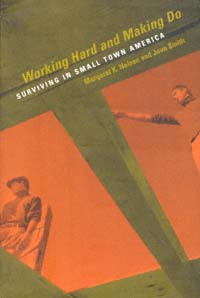 | Title: Working hard and making do: surviving in small town America Author: Nelson, Margaret K 1944- Published: University of California Press, 1999 Subjects: Sociology | American Studies | Politics | Economics and Business Publisher's Description: The economic recovery of the 1990s brought with it a surge of new jobs, but the prospects for most working Americans improved little. Family income rose only slightly and the period witnessed a significant degradation of the quality of work as well as in what people could expect from their waged employment. In this book, Margaret K. Nelson and Joan Smith take a look inside the households of working-class Americans to consider how they are coping with large-scale structural changes in the economy, specifically how the downgrading of jobs has affected survival strategies, gender dynamics, and political attitudes.Drawing on both randomly distributed telephone surveys and in-depth interviews, Nelson and Smith explore the differences in the survival strategies of two groups of working-class households in a rural county: those in which at least one family member has been able to hold on to good work (a year-round, full-time job that carries benefits) and those in which nobody has been able to secure or retain steady employment. They find that households with good jobs are able to effectively use all of their labor power - they rely on two workers; they engage in on-the-side businesses; and they barter with friends and neighbors. In contrast, those living in families without at least one good job find themselves considerably less capable of deploying a complex, multi-faceted survival strategy. The authors further demonstrate that this difference between the two sets of households is accompanied by differences in the gender division of labor within the household and the manner in which individuals make sense of, and respond to, their employment. [brief] Similar Items |
| 59. | 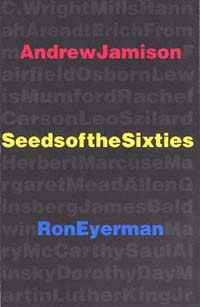 | Title: Seeds of the sixties Author: Jamison, Andrew Published: University of California Press, 1994 Subjects: History | United States History | American Studies | Social Theory Publisher's Description: "The Sixties." The powerful images conveyed by those two words have become an enduring part of American cultural and political history. But where did Sixties radicalism come from? Who planted the intellectual seeds that brought it into being? These questions are answered with striking clarity in Andrew Jamison and Ron Eyerman's book. The result is a combination of history and biography that vividly portrays an entire culture in transition.The authors focus on specific individuals, each of whom in his or her distinctive way carried the ideas of the 1930s into the decades after World War II, and each of whom shared in inventing a new kind of intellectual partisanship. They begin with C. Wright Mills, Hannah Arendt, and Erich Fromm and show how their work linked the "old left" of the Thirties to the "new left" of the Sixties. Lewis Mumford, Rachel Carson, and Fairfield Osborn laid the groundwork for environmental activism; Herbert Marcuse, Margaret Mead, and Leo Szilard articulated opposition to the postwar "scientific-technological state." Alternatives to mass culture were proposed by Allen Ginsberg, James Baldwin, and Mary McCarthy; and Saul Alinsky, Dorothy Day, and Martin Luther King, Jr., made politics personal.This is an unusual book, written with an intimacy that brings to life both intellect and emotion. The portraits featured here clearly demonstrate that the transforming radicalism of the Sixties grew from the legacy of an earlier generation of thinkers. With a deep awareness of the historical trends in American culture, the authors show us the continuing relevance these partisan intellectuals have for our own age. "In a time colored by 'political correctness' and the ascendancy of market liberalism, it is well to remember the partisan intellectuals of the 1950s. They took sides and dissented without becoming dogmatic. May we be able to say the same about ourselves." - from Chapter 7 [brief] Similar Items |
| 60. |  | Title: Mobilizing against nuclear energy: a comparison of Germany and the United States Author: Joppke, Christian Published: University of California Press, 1993 Subjects: Politics | Environmental Studies | German Studies | American Studies | Sociology Publisher's Description: In the past two decades young people, environmentalists, church activists, leftists, and others have mobilized against nuclear energy. Anti-nuclear protest has been especially widespread and vocal in Western Europe and the United States. In this lucid, richly documented book, Christian Joppke compares the rise and fall of these protest movements in Germany and the United States, illuminating the relationship between national political structures and collective action. He analyzes existing approaches to the study of social movements and suggests an insightful new paradigm for research in this area. Joppke proposes a political process perspective that focuses on the interrelationship between the state and social movements, a model that takes into account a variety of forces, including differential state structures, political cultures, movement organizations, and temporal and contextual factors.This is an invaluable work for anyone studying the dynamics of social movements around the world. [brief] Similar Items |